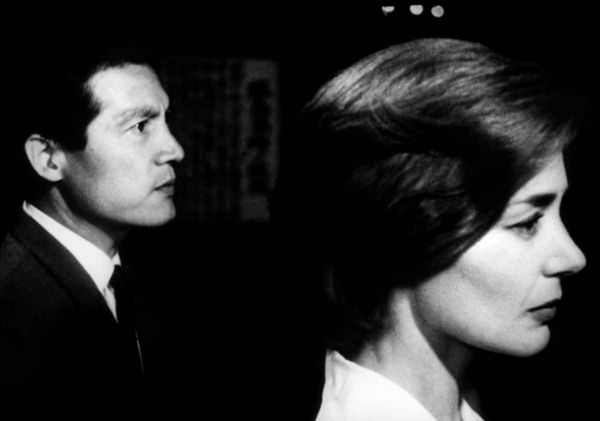Eye For Film >> Movies >> Hiroshima Mon Amour (1959) Film Review
Hiroshima Mon Amour
Reviewed by: Anne-Katrin Titze

Alain Resnais' Hiroshima Mon Amour has lost none of its poignancy and cuts so sharply to the truth about love and war that even after many viewings it is difficult to fully grasp the film's historical significance, storytelling innovations and stylistic brilliance.
"You saw nothing at Hiroshima," the man (Eiji Okada) tells the actress (Emmanuelle Riva) who came to his homeland to make a film about peace. "He" and "She" have embarked on an affair and they talk. Speaking about their past and their countries, about hair and blood, shame and routine.

The project was initially planned to be a documentary about the A-bomb. Marguerite Duras' transfixing screenplay transformed it into a love story.
"Like you I forgot," the actress tells her Japanese lover, only to speak of the forgotten. Her dead German lover in Nevers is resurrected through this new impossible encounter as the third person singular shifts into second. The Japanese man, a married architect whose family died in Hiroshima, accepts the 'you' of her narrative as his. Church bells ring when her "dubious morals" lead deep into the heart caves of finding Nevers-land. Riva's luminous face makes us drown in her eyes.
Images and sounds disjointed and in perfect disharmony, the nouveau roman a close relative, the opening sequence confronts us with shards of Hiroshima - the hospital, the museum with "human flesh suspended" in liquid, a Damian Hirst piece as if "still alive." Shattered stones and skin reconstructed and tourists crying, for "what else can tourists do?" Inadequate re-enactments of catastrophes on film serve Resnais to give a lesson in filmmaking.
It doesn't work to build a set and re-stage the horror. It will never work, he seems to say, and he was right. News clips of the days after the A-bomb was dropped show the "temporary survivors." The discrepancy between the two kinds of footage speaks for itself without words. When rain causes panic and food causes fear, the invisible must be confronted.
The length of Her hair marks the time. In 1943 it was long and blowing in the wind on her bicycle when she met the German soldier in barns and ruins and rooms. She was 18 and he 23. "That's when I almost lost you," the Japanese man says to the French woman. They have 16 hours left before her flight and the seven branches of the Ota delta flow into the Loire.
Resnais and Duras go straight for the mnemonic cornerstones. The impossible love of a French girl in wartime for a German soldier - when did it turn into disgrace for her father? "In the cellar my mother tells me I am 20." The imprisonment out of shame is shown. The townspeople shave the girl's head with gentle smiles on their faces while holding paper scissors in their hands - body language contradicts the violent act.
No mad angry mob follows her up the stairs, some even wipe the hair off her floral summer dress. These insincere gestures cut deeper than anything else he could have chosen to shoot. They had their scapegoat. "Are you ashamed for them, my love?" Now, frogs croak in the dark in Hiroshima. We see no monsters, only people, which makes it worse and more complicated.
She leaves Nevers on her bike, alone and forever, sent off by her mother one August night in 1945 to arrive in Paris on the day that marked the world. Resnais, harrowed by history, managed to build a floating frame capturing the largest of the large in personal heartbreak. And then in the next moment he confronts us with our vanities.
The man, a stranger, after one night spent together is disproportionately happy to be "the only one who knows" her story or whatever it is she told him. "I will remember you as the symbol of love's forgetfulness," should be seen in this context. Both know already that there will be other affairs to come and that it is goodbye for them - unless, one day - a war.
"We'll go to Bavaria and get married," was an impossibility then, 14 years earlier, and during her last night in Hiroshima she walks from an Oasis to the train station into a taxi to a bar named Casablanca, where sounds of a river and an attentive stranger lure her to forget. The grey dawn over Hiroshima causes forgetting and being forgotten.
Fully restored and being shown as part of the 52nd New York Film Festival, Resnais' debut feature celebrates its 55th anniversary during Duras' centenary year.
A question asked often about classic masterpieces - how must it feel for someone to see this film for the first time now? With the Second World War as emotionally distant as the French Revolution for many Millennials, where will the ashes to ashes settle? The radioactive flower imprint on asphalt, shaped like mangled barbed wire and the glistening bodies - statues of cinders and history in an embrace we don't yet know - will the associations only remain with the people covered in the collapsed World Trade Center Towers' debris?
The French/Japanese co-production originally had Chris Marker involved, who dropped out and is still winking at us from the eyes of three cats, two white ones in Hiroshima and a black one in Nevers in a cellar damp from the nearby empty banks of the Loire. Two towns forever linked by a river and a war in Hiroshima Mon Amour.
Reviewed on: 08 Sep 2014














